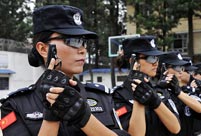 Gallery: Reveal the South Korean beauty production line
Gallery: Reveal the South Korean beauty production line
 Photo story: A rural orphan's wish
Photo story: A rural orphan's wish
 President Xi visits four central Asian nations and attend G20, SCO summits
President Xi visits four central Asian nations and attend G20, SCO summits
 Tibetan ethnic costumes presented during tourism festival in NW China
Tibetan ethnic costumes presented during tourism festival in NW China
 Update the China-ASEAN relationship
Update the China-ASEAN relationship
 Fresh students 'forced' to register in university independently
Fresh students 'forced' to register in university independently
 Vintage cars exhibited at auto cultural festival in China's Shanxi
Vintage cars exhibited at auto cultural festival in China's Shanxi
 Reading by the tongue
Reading by the tongue
 Those embarrassing copycat buildings
Those embarrassing copycat buildings
A string of high-profile scandals involving esteemed professions such as teachers and judges are putting their image at stake, prompting negative associations to the once decent occupations.
Among the latest publicized cases, a primary school headmaster and a government employee in south China's Hainan Province were detained by police for allegedly sexually assaulting six female students in May.
The events triggered widespread discussions online.
"What happened to headmasters and teachers? How many more cases have been uncovered? It breaks my heart," said a user of China's Twitter-like service Sina Weibo under the screen name of Xiaofu8.
"Did you guys catch up with the news? The term for 'headmaster' seems to turn into a derogatory term. When can it win back its fame? Whenever I hear the term, I feel bad," read a post by Liboyuntian.
One Weibo post listed headmasters among the most shameless figures online in 2013 because "their shocking behaviors have tarnished the positive image of the term and triggered a storm of criticism." The post has been forwarded thousands of times.
The term headmaster is not the only word that has lost its positive meaning as the wide use of social media networks has given the public a new channel to scrutinize society and voice their opinions.
The term "judges" has become a target of public sarcasm after a netizen released video footage showing four senior judges in the country soliciting prostitutes at a nightclub in Shanghai. They were later sacked.
Other words that have fallen from grace include "chengguan," Chinese urban management officers, "master" and even "roommate."
China's chengguan officers are no strangers to controversy, as they are often criticized for their violent law enforcement methods for tackling non-criminal urban regulation violations. Reports of their excessive use of force, sometimes leading to death, are common to the point where the very word "chengguan" has become synonymous with violence to the public.
People began to use "master" in an ironic way after reports revealed several cases of illegal medical practices by quacks who were self-proclaimed masters.
Wang Lin, who claims to be a master of qigong, a traditional martial art combined with meditation, was reported to have amassed large sums of money by fooling celebrities through a claimed ability to cure diseases even though he had no medical practitioner license.
The poisoning to death of a postgraduate student at Shanghai's Fudan University in April was used in an online joke that suggested college students "thank roommates for the grace of sparing their lives" in their graduation speech.
"Although some netizens may have taken the chance to vent personal spite, the smear on these Chinese terms shows that the roles played by certain individuals in society have committed serious dereliction of duty, prompting great public disappointment," said Yang Erhong, a professor at the Beijing Language and Culture University.
It is of equal importance that the wrongdoers in these events reexamine their social responsibilities and discipline themselves, and the public do not make a foregone conclusion on a certain group of people only because of the nonfeasance conducted by a few individuals, said the professor.
The tease and ridicule may appear annoying for those who work in the professions, while some find it entertaining and believe that in time the original meaning of the words will come back.
Miao Zhuang, an undergraduate majoring in linguistics at the Communication University of China, has been studying the phenomenon. He said that along with the settling down of events, public focus will shift and these discredited titles will regain their positive connotations.
"People may make fun of words every now and then, but this will not affect their use in formal occasions. On the bright side, these terms have obtained new content and enrichment," Miao said.
 Weekly selection of world photos (Aug.19-Aug.24)
Weekly selection of world photos (Aug.19-Aug.24) Army aviation brigade in actual-troop drill
Army aviation brigade in actual-troop drill Top 10 Chinese provinces for the well-heeled
Top 10 Chinese provinces for the well-heeled  Baby born to save his sister - the story of a savior sibling
Baby born to save his sister - the story of a savior sibling Lady of mystery: Female SWAT team in prison disclosed
Lady of mystery: Female SWAT team in prison disclosed  Single mother, baby live in KFC restaurant for months
Single mother, baby live in KFC restaurant for months Fan Bingbing poses for Malaysian magazine Citta Bella
Fan Bingbing poses for Malaysian magazine Citta Bella Zhang Xinyi covers COSMOPOLITAN
Zhang Xinyi covers COSMOPOLITAN A collection of bizarre rooftop buildings around China
A collection of bizarre rooftop buildings around China 100th birthday of 'Little Mermaid'
100th birthday of 'Little Mermaid' China, U.S. conduct joint anti-piracy drill
China, U.S. conduct joint anti-piracy drill  'Abandoned' life in cement boats in Huai River
'Abandoned' life in cement boats in Huai River 2013 Taiwan Int'l Tourism Expo kicks off in Taipei
2013 Taiwan Int'l Tourism Expo kicks off in Taipei Photo story: Take a gap year
Photo story: Take a gap year Nokia's Global Headquarters: visiting a declining empire
Nokia's Global Headquarters: visiting a declining empireDay|Week|Month